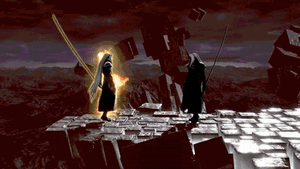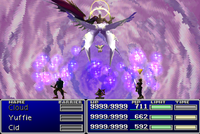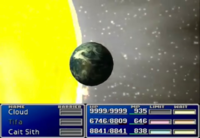Supernova: Difference between revisions
PikaPhantom (talk | contribs) Tag: Mobile edit |
m (→Trivia) |
||
| Line 50: | Line 50: | ||
*Supernova is one of four Final Smashes to incorporate a pre-rendered cinematic, along with [[All-Out Attack]], [[Gigaslash]], and [[House of Boom]]. Like these Final Smashes, it is rendered at 30 FPS rather than 60, possibly as a space-saving measure, and removes damage percentages for its duration. | *Supernova is one of four Final Smashes to incorporate a pre-rendered cinematic, along with [[All-Out Attack]], [[Gigaslash]], and [[House of Boom]]. Like these Final Smashes, it is rendered at 30 FPS rather than 60, possibly as a space-saving measure, and removes damage percentages for its duration. | ||
*Supernova is the longest cinematic Final Smash in series history, at around 8 seconds, beating the previous record held by Gigaslash, which was around 7 seconds. | *Supernova is the longest cinematic Final Smash in series history, at around 8 seconds, beating the previous record held by Gigaslash, which was around 7 seconds. | ||
** | **This mirrors Supernova's infamous length in the international version of ''Final Fantasy VII'', with the move taking just over two minutes to play out. | ||
*Like in the original ''Final Fantasy VII'', a series of mathematical equations appear in the background at the start of the move. Unlike the original, which applied equations in the field of astrophysics to determine the overall conditions needed to perform Super Nova (which infamously based the conditions around if the celestial body that would trigger the supernova was operating on a two dimensional plane, which was a flat circle, as well as ignoring that the Sun itself in astronomical terms is designated as a {{s|wikipedia|main sequence}} star, and itself is unable to go supernova due to a lack of mass), the equations depicted during the sequence instead are well-known formulas that apply to quantum mechanics, fluid dynamics, and spacetime, such as the {{s|wikipedia|Hellmann-Feynman theorem}} and [[wikipedia:Einstein field equations|the Einstein gravitational constant]].<ref>https://old.reddit.com/r/smashbros/comments/kffbsv/explaining_the_equations_in_sephiroths_final_smash/</ref> | *Like in the original ''Final Fantasy VII'', a series of mathematical equations appear in the background at the start of the move. Unlike the original, which applied equations in the field of astrophysics to determine the overall conditions needed to perform Super Nova (which infamously based the conditions around if the celestial body that would trigger the supernova was operating on a two dimensional plane, which was a flat circle, as well as ignoring that the Sun itself in astronomical terms is designated as a {{s|wikipedia|main sequence}} star, and itself is unable to go supernova due to a lack of mass), the equations depicted during the sequence instead are well-known formulas that apply to quantum mechanics, fluid dynamics, and spacetime, such as the {{s|wikipedia|Hellmann-Feynman theorem}} and [[wikipedia:Einstein field equations|the Einstein gravitational constant]].<ref>https://old.reddit.com/r/smashbros/comments/kffbsv/explaining_the_equations_in_sephiroths_final_smash/</ref> | ||
Revision as of 13:18, January 6, 2021
| Supernova | |
|---|---|
 Sephiroth using Supernova in Ultimate. | |
| User | Sephiroth |
| Universe | Final Fantasy |
Supernova (スーパーノヴァ, Supernova) is Sephiroth's Final Smash.
Overview
Sephiroth swings his sword forward, catching up to three opponents. A cutscene initiates in which he transforms into Safer Sephiroth, followed by summoning a meteor that passes through a planet and into a star, causing the star to explode and destroy an Earth-like planet. The trapped opponents are then launched.
The move has a random effect on each opponent it launches (acting similar to Negative Zone from Brawl). In addition to dealing a total of 32% damage, each will suffer from one randomly chosen "debuff":
- Being put to sleep for 8.67 - 22 seconds.
- Gaining a very large flower for 6.67 - 30 seconds.
- Have their controls reversed for 6.67 - 25 seconds.
- Enter their shield break state, and be stunned for 6.67 - 20 seconds. They are not simply stunned as with moves such as Disable; they go through the full shield break process. As a result, Jigglypuff is blasted upwards as is typical for its shield break.
- Getting slowed down to half speed for 6.67 - 25 seconds.
- Being launched a little further than usual, with a darkness effect.
The sleep, reverse, and shield break results cannot occur on opponents that were offstage when the move began; however, they can still occur in the air.
Instructional Quotes
| Swing the sword forward in a wide range. If it hits an opponent, Safer Sephiroth will appear and deal massive damage with a supernova explosion that can also sometimes inflict status effects. The first swing can hit up to three opponents. |
Origin
Safer∙Sephiroth is the form that Sephiroth takes during the third phase of the final battle in Final Fantasy VII. This is the body that Sephiroth was creating for himself in the Northern Cave, as part of his plan to wound the Planet with Meteor, bait the lifestream into emerging to heal the wound, and merge with it to become a god. Despite this being the second-to-last phase, Safer∙Sephiroth is considered the final challenge of the main story, since the fourth phase pits Cloud against a metaphysical Sephiroth in a cinematic battle that cannot be lost.
Supernova, formatted as "Super Nova" in Final Fantasy VII, is Safer∙Sephiroth's ultimate attack. The Final Smash is a heavily-abridged recreation of the move from the international version of FFVII, which has become infamous for its ability to draw the battle out: it has an excessively long and elaborate animation (taking a full two minutes to execute[1]), Sephiroth can use it multiple times during a battle, and it causes the player to sit through the animation of their party's health dropping, which can take a significant amount of time when they have reached their level cap. The move involves summoning a meteor to ravage the galaxy and turn the Sun into a supernova that engulfs the Planet, dealing fractional damage equal to 15/16 of the party's current HP and inflicting random status ailments on them. The original Japanese version of the move has a very different and much shorter animation (clocking in at 20 seconds[2]), and it deals non-fractional damage, making it possible to wipe out the party.
The Final Smash is able to trap up to three opponents at once, referencing the number of available party member slots in Final Fantasy VII; when the move is activated, the three trapped players will face Safer∙Sephiroth, as the party does in the boss battle.
Gallery
Sephiroth using Supernova as shown by the Move List in Ultimate.
Trivia
- Using this move against Mr. Game & Watch will show his model in 3D, as with Triple Wolf.
- This is the fourth cinematic Final Smash for a DLC character in Ultimate that can catch more than one character, after All-Out Attack, Gigaslash, and Progenitor God Ruptured Heaven.
- Supernova is one of four Final Smashes to incorporate a pre-rendered cinematic, along with All-Out Attack, Gigaslash, and House of Boom. Like these Final Smashes, it is rendered at 30 FPS rather than 60, possibly as a space-saving measure, and removes damage percentages for its duration.
- Supernova is the longest cinematic Final Smash in series history, at around 8 seconds, beating the previous record held by Gigaslash, which was around 7 seconds.
- This mirrors Supernova's infamous length in the international version of Final Fantasy VII, with the move taking just over two minutes to play out.
- Like in the original Final Fantasy VII, a series of mathematical equations appear in the background at the start of the move. Unlike the original, which applied equations in the field of astrophysics to determine the overall conditions needed to perform Super Nova (which infamously based the conditions around if the celestial body that would trigger the supernova was operating on a two dimensional plane, which was a flat circle, as well as ignoring that the Sun itself in astronomical terms is designated as a main sequence star, and itself is unable to go supernova due to a lack of mass), the equations depicted during the sequence instead are well-known formulas that apply to quantum mechanics, fluid dynamics, and spacetime, such as the Hellmann-Feynman theorem and the Einstein gravitational constant.[3]
Names in other languages
| Language | Name |
|---|---|
| スーパーノヴァ, Supernova | |
| Supernova | |
| 초신성, Supernova |





